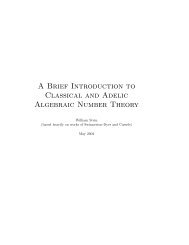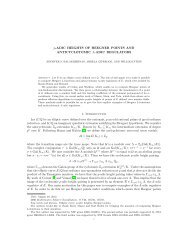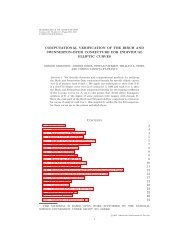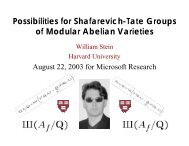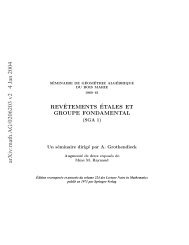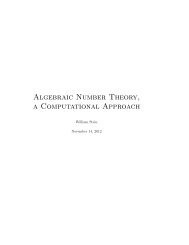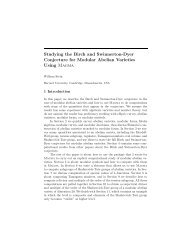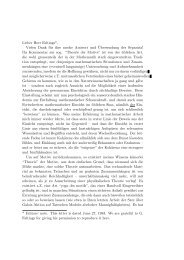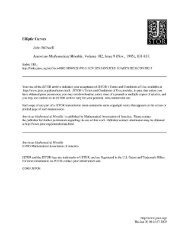A Short Course on Galois Cohomology - William Stein - University of ...
A Short Course on Galois Cohomology - William Stein - University of ...
A Short Course on Galois Cohomology - William Stein - University of ...
Create successful ePaper yourself
Turn your PDF publications into a flip-book with our unique Google optimized e-Paper software.
(ix) For any integer n and any (commutative) A elsewhere in this list, the<br />
group A[n] <strong>of</strong> elements <strong>of</strong> order dividing n is a G-module.<br />
(x) The p-adic Tate module Tatep(A) = lim<br />
←− A[p n ] associated to an abelian<br />
variety A.<br />
17.4 The Additive and Multiplicative Groups <strong>of</strong> a Field<br />
We recall some basic facts from <strong>Galois</strong> theory. Suppose L/K is a finite <strong>Galois</strong><br />
extensi<strong>on</strong> <strong>of</strong> fields, which means that # Aut(L/K) = [L : K], or equivalently,<br />
L is the splitting field <strong>of</strong> a single irreducible separable polynomial f ∈ K[x].<br />
We write Gal(L/K) = Aut(L/K).<br />
Propositi<strong>on</strong> 17.3. Let L/K be any <strong>Galois</strong> extensi<strong>on</strong> <strong>of</strong> fields. Then for all<br />
q ∈ Z,<br />
ˆH q (L/K, L) = 0.<br />
Pro<strong>of</strong>. Without loss, we may assume that L is a finite extensi<strong>on</strong> <strong>of</strong> K, since<br />
otherwise, we use the result <strong>on</strong> each finite subextensi<strong>on</strong> and take the limit.<br />
Since L/K is finite separable, by the normal basis theorem from <strong>Galois</strong><br />
theory, there exists α ∈ L such that, letting Kβ denote the 1-dimensi<strong>on</strong>al<br />
K-vector space spanned by β, we have<br />
L =<br />
<br />
Kσ(α) ∼ = K ⊗Z Z[Gal(L/K)]. (17.1)<br />
σ∈Gal(L/K)<br />
But then L is induced, from which the c<strong>on</strong>clusi<strong>on</strong> follows.<br />
Propositi<strong>on</strong> 17.4. Let L/K be any <strong>Galois</strong> extensi<strong>on</strong> <strong>of</strong> fields. Then<br />
H 1 (L/K, L ∗ ) = 0.<br />
Pro<strong>of</strong>. As above, we may assume that L/K is a finite extensi<strong>on</strong>. Suppose<br />
f : Gal(L/K) → L∗ is a 1-cocycle. For any c ∈ L, c<strong>on</strong>sider the sum<br />
b =<br />
<br />
f(σ)σ(c).<br />
σ∈Gal(L/K)<br />
If b = 0 for all c, then the elements <strong>of</strong> Gal(L/K) are linearly dependent. But<br />
in view <strong>of</strong> Equati<strong>on</strong> (17.1), this would imply that the c<strong>on</strong>jugates <strong>of</strong> a normal<br />
basis element α would generate a field <strong>of</strong> degree < [L : K], a c<strong>on</strong>tradicti<strong>on</strong>.<br />
Thus there exists c ∈ L with b = 0. Then for any σ ∈ Gal(L/K), we have<br />
0 = σ(b) = <br />
σ(f(τ))στ(c) = <br />
f(σ) −1 f(στ)στ(c) = f(σ) −1 b,<br />
τ<br />
so f(σ) = bσ(b) −1 , hence f is a coboundary.<br />
στ<br />
32




